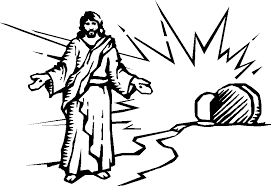~ Quasimodo Geniti ~
Readings: Ezekiel 37:1-14 | 1 John 5:4-10 | John 20:19-31
Text: John 20:19-31
Alleluia! Christ is risen!

Christ is risen from the dead, our paschal lamb has been sacrificed, our mouths are filled with Hallelujah’s/Praise the Lord.[1] But, what does all this mean for us day by day? What has really changed about our lives?
Something that hasn’t changed is weakness and fear. Just look at the disciples. The event that has bearing on all eternity has taken place, and they’re living like business as usual. Even more so, they’re living as if Jesus were dead and the Jews are coming to snuff them out too. Not just once, even. The second time, even after Jesus has come, they still sit behind locked doors in fear of what men can do.
In a similar vein, we might rejoice to be in worship with the Lord and our brothers and sisters, but later today we’ll sin again and fall into old habits. We fall back into thinking and living as if God were dead and we’re the ones whose lives matter most. Take an honest, godly look at this past week. How often have you defied God or even dared Him to keep you from sinning? How many other people have you sinned against by your thoughts, words, or actions? Honestly, did Easter have any effect on us?
This dichotomy often leads us to frustration, verging on despair that we’re not doing something right. The devil would love for us to believe that because we can’t seem to overcome various sins, that we must not really be saved.

But that’s precisely when God enters into our locked doors with the peace which changes everything. “Christ, our Passover lamb, has been sacrificed” for you; your sins are atoned for. Yes, God is grieved by your sins, but His Son willingly bled and died so that you would have forgiveness and eternal life. Believe that even you have peace with God through Jesus Christ. Listen to how the Word of God speaks of even the grossest sins: “Do not be deceived: neither the sexually immoral, nor idolaters, nor adulterers, nor men who practice homosexuality, 10 nor thieves, nor the greedy, nor drunkards, nor revilers, nor swindlers will inherit the kingdom of God. 11 And such were some of you. But you were washed, you were sanctified, you were justified in the name of the Lord Jesus Christ and by the Spirit of our God.” (1 Cor. 6:9-11) These are sins with big consequences, irreparable relationships, some of crimes punishable with jail time. But you were washed, you were sanctified, you were justified—there is where Holy Absolution comes in to release you from your sins and give you peace with God and strength to bear the crosses of this life.
It is our patient, loving Lord’s pleasure to proclaim this good news again and again. With the disciples in the Upper Room, twice He greats them with a message of absolution: “Peace be with you.” And this is exactly what He intends to keep on doing for the people who “believe that He is the Christ, the Son of God.”
That’s exactly what Jesus is doing when He says to His disciples, “As the Father has sent Me, even so I am sending you.” If we were spiritual enough to understand the Gospel, and strong enough to always lay hold of His forgiveness, the Lord would have done no more than leave a Bible at our doorstep. See? It’s a how-to guide on peace with God. It’s not that simple.
First of all, we have as hard a time forgiving others as Thomas does believing the report of ten eye-witnesses. We dwell on how others have hurt us. “Yes, but the fact is he hurt me!” It keeps us up at night. It clenches our jaws when even a hint of the memory passes. The deeper the sin cut, the wider the chasm to cross to arrive at forgiveness.
Secondly, we are prone to hold the Lord’s forgiveness in our minds, but not let it enter our hearts. This is a weakness of faith, which acknowledges the facts of the Gospel, but fails to grasp the “for you” of it. This type of malformed faith can easily die in despair, believing the lie that our own sins can’t be covered by the blood of Jesus. Something we’ve done can eat us up, disturb our dreams, and make us loathe the person in the mirror. Yes, with our minds, we know Christ’s death covers all of our sins and that we are God’s children. But sometimes that isn’t enough to break through to our troubled heart. We need outside help.

The Lutheran confessions explain, “So that we may obtain this faith, the ministry of teaching the Gospel and administering the Sacraments was instituted. Through the Word and Sacraments, as through instruments, the Holy Spirit is given. He works faith, when and where it pleases God, in those who hear the good news.”[2]
The Prophet Isaiah described this poetically: “How beautiful upon the mountains are the feet of him who brings good news of happiness, who publishes salvation.”[3] The Lord wants that proclamation of good news to continue. It’s the bedrock upon which His Church is founded.[4] His Church is a place where sins are forgiven for His sake. The repentant hear that word of peace and rejoice at its sound.
Forgiveness proclaimed is so foundational that on the night of His resurrection, He institutes three key things for our good: Corporate worship (coming together) around His Word, The Pastoral Ministry, Confession and Absolution. He wants His sin-killing, life-giving Word spoken and taught. Yet, as I said before, we need that Word of reconciliation and peace to come to us. Knowing this, our gracious Lord sends us His called servants, jars of clay that carry heavenly gifts, stewards who bear the mysteries of God.[5]
The Lord said to those ten who were gathered, in fear for their lives, “Receive the Holy Spirit. If you forgive the sins of any, they are forgiven them; if you withhold forgiveness from any, it is withheld.” Are these men granted special powers that others don’t have? Certainly not by themselves. Just as the prophets of old, they echo what the Lord says. Their solemn duty is to speak forgiveness to all who repent, and to withhold forgiveness from all who despise the Word of the Lord. That’s exactly what God says in the Scriptures.
Next is what we call today private confession and absolution. “Receive the Holy Spirit. 23 If you forgive the sins of any, they are forgiven them; if you withhold forgiveness from any, it is withheld.” Absolution has so many factors working against it: the “me and Jesus” sentiment that American Protestantism breeds; the post-Covid isolation; and sin itself which, from the very first day showed that it would rather cover things up and blame others instead of confessing to God. But Jesus knows what you and I need: the cure to sin. That cure comes in more than one way, and among the most potent is confessing your sins out loud before God in the presence of His called minister, so that Jesus, who sent that man, may declare to you, “In the stead and by the command of my Lord, Jesus Christ, I forgive you all your sins in the Name of the Father and of the Son and of the Holy Spirit.”

Finally, what we see in Thomas is the danger of excluding yourself from corporate worship. The ten disciples are gathered together, but Thomas is willfully absent. We find out that it was intentional, because of how he responds to the others saying the Lord lives: “Unless I see in his hands the mark of the nails, and place my finger into the mark of the nails, and place my hand into his side, I will never believe.” Thomas puts God to the test by demanding that He do things Thomas’ way. And because he says God must fulfill this demand of his, Thomas teeters on the edge of deadly peril, of blaspheming the Holy Spirit. He’s putting himself above God, and then when he loses salvation, is he going to blame God for not doing enough? What demonic reasoning!
Now, Jesus does condescend to Thomas’ demand, but that was one time and to teach us all a lesson: “Blessed are those who have not seen and yet have believed.” God will not tolerate our putting him to the test by neglecting His messengers, refusing to be released from our sins, and withdrawing from the fellowship of the saints to our own peril. “Do not be deceived: God is not mocked, for whatever one sows, that will he also reap. 8 For the one who sows to his own flesh will from the flesh reap corruption, but the one who sows to the Spirit will from the Spirit reap eternal life.” (Gal. 6:7-8)
The elders and I were talking this way about the best way to minister to those who show up so rarely in church, but somehow have time on Easter Sunday. What can we do for those for whom Christ is just so unimportant that they can go months and years without having His Word of peace to come them? The first thing is to pray that the Lord would make them desperate for their Lord. Whatever has dulled their appetite for the Words of Eternal Life, let it perish, so that their soul would be saved! Another part of that is to reach out to them, not merely to remind them of “one more thing they ought to be doing,” but to invite them to have their sins forgiven and life restored by Jesus, just as the disciples did for Thomas. Finally, to deny them the Lord’s Supper until they realize their error. I’ve made the mistake of communing people, hoping that somehow receiving the Sacrament would lead to their reconversion, but I was wrong. Our Lord teaches us here that the Sacrament of the Altar and the Absolution are for those who are broken by their sins and whose hope is in Jesus.
From the very beginning, the Lord Jesus made His Church to be a place of forgiveness for sinners (including pastors). In the midst of the world and our heart that constantly cry out for justice and vengeance, the Lord has made His Church to be a haven from storms both internal and external. As often as you are buffeted by your own sins and the sins of others against you, your Savior brings His peace right into your ears. As a called and ordained servant of Christ, and on His authority I say, “Peace be with you,” through Jesus Christ our Lord. Amen.

[1] Psalm 146:1
[2] Augsburg Confession V 1-2
[3] Isaiah 52:7
[4] Matthew 16:18-19
[5] 2 Corinthians 4:7, 1 Corinthians 4:1
Leave a Reply